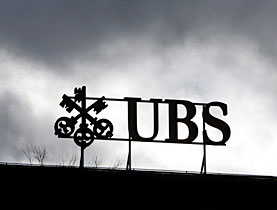UBS takes another hit

The Swiss stock exchange was seeing red for the second consecutive day, with banks – notably UBS – and insurance companies feeling the brunt of investors' panic.
After rivals in the United States took a renewed pounding when the New York market opened, UBS shares fell to SFr15.18 ($13.55), an all-time low, before rallying and closing Tuesday down 17.21 per cent at SFr16.64.
That followed a tumble of 14.8 per cent on “Meltdown Monday”, when US investment bank Lehman Brothers went bankrupt, its Wall Street rival Merrill Lynch was sold at a knockdown price and the world’s largest insurer, AIG, had to go cap in hand to the Federal Reserve for an emergency bailout.
On Tuesday, the Federal Reserve announced a rescue package for AIG worth $85 billion.
Shares were also down in afternoon trading on Tuesday at Credit Suisse (about seven per cent) and Julius Bär (more than three per cent). Both banks rallied slightly before trading closed.
The share price of the world’s largest reinsurance company, Swiss Re, also took a hammering, falling by 13 per cent.
Swiss Re estimates its exposure (excluding reinsurance) to AIG at approximately SFr200 million.
The SMI closed down 2.97 per cent, following a 3.83 per cent drop on Monday.
Risky holdings
“Asset qualities on UBS risky holdings have worsened dramatically, and investors are pricing that in, including the possibility of a third cap hike,” said Dieter Winet, a portfolio manager at Swisscanto, who estimated writedowns of SFr5 billion for the quarter.
UBS still holds $54.3 billion (SFr60.8 billion) of risky positions – including $8.2 billion in commercial mortgage-backed securities and $6.7 billion in subprime securities – making it vulnerable to swings in values.
UBS spokeswoman Sabine Wössner reiterated on Tuesday that the bank could absorb further market shocks thanks to the SFr29 billion it raised earlier in the year but declined to disclose specifics or comment on speculation that the bank would need a third cap hike.
UBS did, however, say on Tuesday that its losses would be limited to $300 million as a result of Monday’s bankruptcy of Lehman Brothers.
UBS said its “direct and counterparty exposures to Lehman Brothers, net of hedges, are now substantially closed out”.
Those losses would be small change compared with the $42 billion the bank has already written off on the US subprime crisis, forcing it to break up its One Bank strategy.
Swiss Re exposure
Oil prices dropped another five per cent to a seven-month low of $91.15 a barrel on Tuesday, extending the steepest two-day slide since 2004 as the mounting economic turmoil sent investors fleeing to safer havens.
Slowing demand in the US and other top consumer nations has sent crude prices tumbling from record highs of over $147 a barrel in July.
The problems at insurer AIG added to fears about the financial sector’s stability and the outlook for the global economy.
“AIG has more to do with the oil price right now than the Saudis do,” said Larry Grace, an analyst at Kim Eng Securities in Hong Kong.
Swiss Re shares fell 13 per cent on Tuesday after a spokesman declined to comment on the company’s AIG exposure. On Wednesday the company put the figure at around SFr200 million.
Bank support
Major European central banks pumped yet more billions in short-term credit into the financial system on Tuesday in an effort to shore up confidence.
The European Central Bank, which oversees monetary policy in the 15 countries that use the euro, launched its second one-day refinancing operation in as many days, offering €70 billion at a 4.25 per cent bid rate.
The Swiss National Bank (SNB) also offered extra money in a one-day operation after it provided some SFr8 billion at a 1.9 per cent rate the day before. It did not immediately comment on the amount provided or bids received.
“The current events in the United States show that it is still too early to say the storm is over,” said Philipp Hildebrand, SNB vice-chairman, in Lausanne on Tuesday.
“We follow the events very attentively. And we are in very close contact with our large banks as well as the regulators and foreign central banks.”
Hildebrand added he was in favour of strengthening capital rules for the Swiss banking system but promised the news practices would be implemented in such a way so as not to harm the banking system.
“For the near term, the essential priority for Switzerland, as well as for the international financial system, is to get out of this period of severe turbulence,” he said.
swissinfo with agencies
The world’s financial markets were rocked by bad news from a trio of big players in the US on Monday.
Investment bank Lehman Brothers collapsed under the weight of subprime mortgage debt and filed for bankruptcy after failing to find a buyer. The news rang alarm bells around the globe as other banks calculated how much money they would lose from deals previously struck with the 158-year-old institution.
On the same day, investment bank Merrill Lynch was forced to accept defeat and was sold at a knockdown price of $50 billion to Bank of America. The deal mirrored the humiliating sale of Bear Stearns to JP Morgan in March.
The world’s largest insurer, AIG, petitioned the Federal Reserve for a $40 billion handout to shore up its shaky finances.
The problems were sparked months ago by the collapse of the US subprime mortgage industry that lent money to people with poor credit ratings to buy homes. The financial markets traded these loans around the world and suffered huge losses as the US housing market dried up and home prices dropped.

In compliance with the JTI standards
More: SWI swissinfo.ch certified by the Journalism Trust Initiative











You can find an overview of ongoing debates with our journalists here . Please join us!
If you want to start a conversation about a topic raised in this article or want to report factual errors, email us at english@swissinfo.ch.